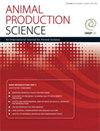饲粮缺乏亮氨酸会改变母科布肉鸡的生产性能、体成分、肠道微生物群和免疫反应
IF 1.2
4区 农林科学
Q2 Agricultural and Biological Sciences
引用次数: 0
摘要
亮氨酸(Leucine, Leu)是一种支链氨基酸,是肌肉蛋白质合成所必需的。禽类饲料原料中基本上含有大量的亮氨酸,但饲粮中亮氨酸缺乏对母鸡生产性能和健康指标的影响尚不清楚,这可能发生在粗蛋白质限制饲粮中。目的研究饲粮中缺乏亮氨酸对雌性肉仔鸡生长性能、体成分、免疫力和盲肠微生物群的影响。方法雌性肉鸡(Cobb 500;8天;采用完全随机设计,将540只鸡随机分为6组,每组6个重复,每个重复15只。试验饲粮的亮氨酸浓度分别为80%、84%、88%、92%、96%和100%,饲喂14d。以80%推荐水平配制基础缺亮氨酸饲粮,逐步用结晶l -亮氨酸替代结晶l -谷氨酸。研究平均日采食量(ADI)、平均日增重(ADG)、饲料效率(增重:饲料)、体组成、对植物血凝素- p (PHA-P)的皮肤嗜碱性粒细胞超敏反应(CBH)、对绵羊红细胞(SRBC)的抗体反应和盲肠微生物群的反应。结果低亮氨酸水平饲粮的ADI最低(P<0.05),脂肪含量比96%亮氨酸水平饲粮的高20% (P<0.01),大肠杆菌和大肠菌群数量显著增加(P<0.001);与100%亮氨酸饲粮相比分别减少了36%和10.3%),乳酸菌(未见肠球菌)数量减少(P<0.001);不同亮氨酸浓度对平均日增重、饲料效率、胴体干物质、蛋白质和灰分率及免疫力均无显著影响。结论亮氨酸缺乏影响肉鸡生产性能、体成分和盲肠微生物群,但不影响免疫反应。本研究指出了在肉鸡饲粮中添加亮氨酸对改善肉鸡生长性能、脂肪含量和肠道健康的重要性。本文章由计算机程序翻译,如有差异,请以英文原文为准。
Dietary leucine deficiency alters performance, body composition, intestine microbiota, and immune response of female Cobb broilers
Context Leucine (Leu) is one of the branched-chain amino acids that is necessary for muscle protein synthesis. Basically, poultry feed ingredients contain abundant amounts of Leu. But little is known about dietary Leu deficiency in performance and health-attributing parameters of female broiler chickens, which may occur in crude protein-restricted diets.Aims This study evaluates the effect of Leu deficiency in diets on the growth performance, body composition, immunity, and caecum microbiota of female broilers.Methods Female broiler chicks (Cobb 500; 8days old; n=540) were randomly divided into six groups with six replicates (15 birds in each replicate) in a completely randomised design. The experimental diets included six concentrations of Leu (80%, 84%, 88%, 92%, 96%, and 100%) fed for 14days. A basal Leu-deficient diet was formulated at the 80% recommended level, and the experimental diets were created by gradual replacing of crystalline L-glutamic acid with crystalline L-Leu. Average daily intake (ADI), average daily gain (ADG), feed efficiency (gain:feed), body composition, cutaneous basophil hypersensitivity (CBH) test to phytohaemagglutinin-P (PHA-P), antibody response to sheep red blood cell (SRBC) and caecum microbiota were investigated.Key results The birds receiving the lowest Leu application level had the lowest ADI (P<0.05) and a 20% higher fat content (P<0.01) than did the birds fed 96% Leu. The population of Escherichia coli and coliform bacteria count was increased (P<0.001; by 36% and 10.3% compared with the birds fed 100% Leu in the diet respectively), and Lactobacillus (but not Enterococcus) count was decreased (P<0.001; by 26.4% compared with the birds fed 100% Leu in the diet) with decreasing concentrations of dietary Leu. Average daily gain, feed efficiency, carcass dry matter, protein and ash percentages, and immunity were not affected markedly by dietary treatments with different Leu concentrations.Conclusions The Leu deficiency influenced the broiler performance, body composition, and caecum microbiota, but not the immune response.Implications This study points to the importance of Leu supplementation in the diet of broilers to improve their growth performance, fat content, and intestine health.
求助全文
通过发布文献求助,成功后即可免费获取论文全文。
去求助
来源期刊

Animal Production Science
Agricultural and Biological Sciences-Food Science
CiteScore
3.00
自引率
7.10%
发文量
139
审稿时长
3-8 weeks
期刊介绍:
Research papers in Animal Production Science focus on improving livestock and food production, and on the social and economic issues that influence primary producers. The journal (formerly known as Australian Journal of Experimental Agriculture) is predominantly concerned with domesticated animals (beef cattle, dairy cows, sheep, pigs, goats and poultry); however, contributions on horses and wild animals may be published where relevant.
Animal Production Science is published with the endorsement of the Commonwealth Scientific and Industrial Research Organisation (CSIRO) and the Australian Academy of Science.
 求助内容:
求助内容: 应助结果提醒方式:
应助结果提醒方式:


